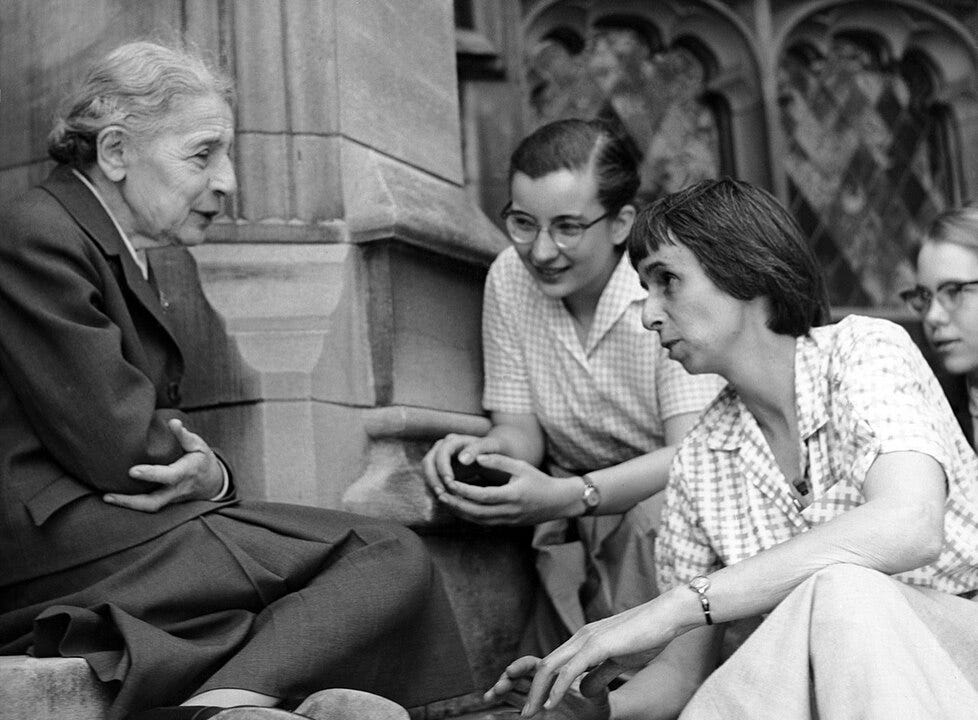Lise Meitner, physicist who discovered nuclear fission
You've heard of Einstein, Oppenheimer, Bohr, and Heisenberg. But have you heard of Lise Meitner? She lived a fascinating and difficult life and made a crucial discovery for the atom bomb.
This book is fantastic! The Woman Who Split the Atom: The Life of Lise Meitner by Marissa Moss is about the Austrian Jewish physicist Lise Meitner who discovered nuclear fission during World War II.
Meitner was the first to realize the uranium atom could be split into two lighter elements plus energy. That released energy is the crucial part—her discovery led to the development of the atom bomb by physicists in the United States, although Meitner herself was vehemently opposed to using scientific results to develop weapons.
I have a bachelor's degree in physics, and while I am familiar with many of Meitner’s colleagues — Einstein, Bohr, Heisenberg — I didn’t recognize her name before reading this book. She was nominated for Physics and Chemistry Nobel Prizes an astounding 49 times, but never won.
Meitner’s life was a relentless struggle for acceptance as a woman interested in science, and then as a Jew who escaped Nazi Germany. She also had, relatively, a lot of help and support (although, frustratingly, not much support in publicizing her accomplishments). Her father was an upper-middle-class lawyer and supported all his children in earning advanced degrees. She was the right age to be among the first women to attend the University of Vienna, studying extensively on her own for the high school exam without being allowed to attend high school with the boys. She was one of the first women to earn a doctoral degree in physics.
After graduating, Meitner’s career as a scientist started out in the basement of a lab building, with a table of homemade equipment and a long walk to a women’s bathroom in a restaurant. She wasn’t allowed in the upstairs lab with the men. She also wasn’t paid.
Despite the restrictive working conditions, Meitner focused intensely on her research. Within the next few years, she negotiated a paid position, access to the lab, and a women’s bathroom in the building.
Meitner collaborated with Otto Hahn, a chemist collecting experimental data on radioactive elements. Their work partnership lasted for over 30 years.
After Hitler gained control of Nazi Germany, Jewish physicists were seen as a threat by the regime. Meitner did not consider herself a religious Jew, and as she had Austrian citizenship, she was at first unconcerned by the new restrictions in Berlin where she worked. She maintained her narrow focus on her work. By the time she considered leaving the country, her Austrian passport was invalid because Germany had unified with Austria.
Meitner’s colleagues and physics friends in other countries collaborated to rescue her from Nazi Germany. They lobbied for a job offer, papers, and Coster travelled to Berlin personally to take the train with Meitner to the Netherlands. Very fearful, she crossed the border without incident, probably because the German guards assumed she was Coster’s wife and not a person of interest.
Safe in another country, Meitner did not have any lab equipment and worked with some of Hahn’s data. She was able to solve the mystery of his experiments with uranium that initially didn’t make sense to anyone. The uranium atoms were splitting into two lighter atoms and releasing a lot of energy in the process. This scientific discovery allowed the physicists of the Manhattan Project to construct the atom bomb.
As with most groundbreaking experimental discoveries, Meitner was talented enough to understand the right explanation of the data and she was also in the right place at the right time.
Meitner remained anti-war throughout her life and spoke against the Nazi regime, criticizing her colleagues who did not support her or other Jewish people in their communities. She was horrified to learn of the detonation of the bombs in Japan.

Meitner gave a talk on her early research with Albert Einstein in the audience. He clapped enthusiastically.
I wonder what such a motivated and talented physicist could have achieved if given a similar opportunity as her male, non-Jewish peers in Berlin at that time.
I’m excited to announce another session of my online creative nonfiction class Writing the Personal Essay starting September 12th! Early bird price until Sept 1 is $100. Click here for more details.
For more mountains, lakes, and wildlife, check out my trip videos on:
YouTube (videos of full hikes!): https://www.youtube.com/@reywrites
TikTok: https://www.tiktok.com/@reywrites
Instagram: https://www.instagram.com/reywrite/
Facebook: https://www.facebook.com/rreykatz
Thanks so much for reading my newsletter. It means a lot to me.
Take care,
Rey







Fascinating story, thank you. Meitner certainly deserved the Nobel Prize and it’s puzzling why she was denied so many times. I have known several Nobel Laureates, including my good friend and hiking partner Barry Blumberg. It is clear to me that the Prize is very political, characterized by intense infighting, especially in the physics community. But we can certainly honor Meitner for her achievements as you have done, and especially appreciate her adamant refusal to work on nuclear weapons.